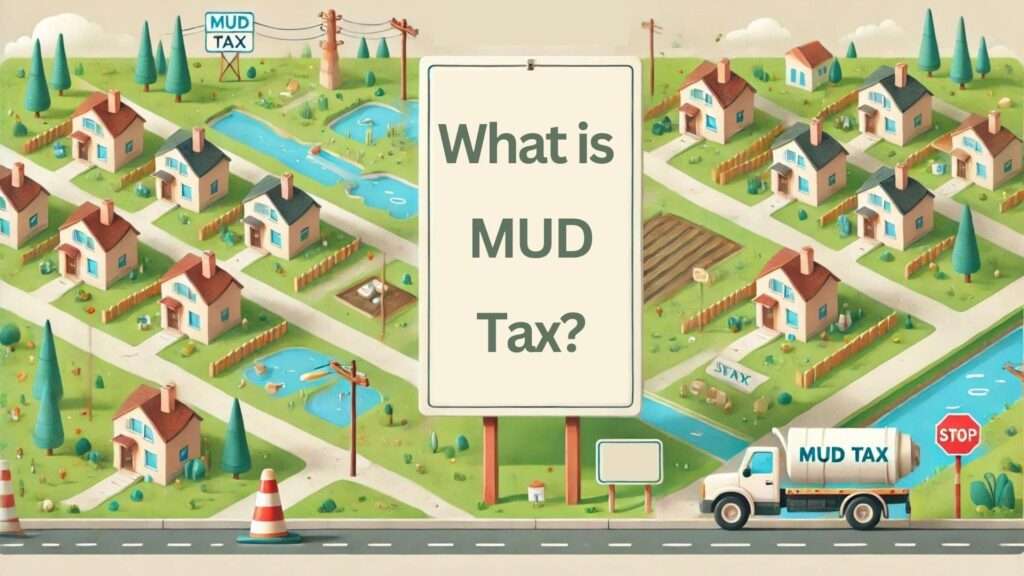
Homeowners often face confusion about MUD tax and its implications. Municipal Utility Districts (MUDs) are vital for developing infrastructure in areas outside of city limits. Many people struggle with understanding how MUD taxes affect their property’s assessed value and overall tax bill.
MUD taxes generally fund essential services like water and sewage. These taxes are typically paid through escrow. Although MUD taxes can improve community amenities, they may also increase overall tax burdens.
This article provides a comprehensive guide on MUD tax, explaining its benefits and drawbacks to help you make informed decisions.
What is a MUD Tax?
A MUD tax, levied by a Municipal Utility District, funds infrastructure and utility services like water and sewer. These districts, common in the state of Texas, enable developers to finance essential community facilities. Property owners within MUDs pay this tax, which appears alongside their property tax. In some cases, property owners may be eligible for a tax credit to offset part of the cost. The funds collected support the construction and maintenance of utilities, drainage systems, and community amenities.
Board members, elected by residents, oversee the district’s operations, ensuring transparency and accountability. This tax allows for well-developed infrastructure without initial high costs for developers.
How Much is the MUD Tax?
The MUD tax rate varies based on the district’s needs and financial obligations. Typically, the tax rate ranges from $0.50 to $1.50 per $100 of assessed property value. Property owners can find specific rates on their annual property tax statements. The tax is calculated similarly to property tax, ensuring necessary funds for utility and infrastructure maintenance.
Homeowners should contact their district’s board members for precise information. Living in a MUD often means additional taxes, but the enhanced property values and improved services provide significant benefits.
Benefits of MUD Tax
- Improved Infrastructure: MUD taxes finance water and sewer projects in rural areas that lacked the resources to build their own infrastructure.
- Enhanced Community Amenities: Municipal Utility Districts provide services such as parks, recreational facilities, parking solutions, and other important infrastructure projects.
- Development of New Housing: MUDs allow builders and developers to fund the development of infrastructure in areas outside of city limits, promoting new housing for families and individuals.
- Reduced Initial Costs for Homeowners: MUDs share the cost of infrastructure development with homeowners, reducing the initial financial burden.
- Community Growth and Improvement: As the community grows, the publicly elected board ensures continuous improvement and maintenance of infrastructure.
- Property Value Increase: Quality infrastructure and services provided within the district can enhance the overall value of your property.
- Efficient Service Delivery: MUDs provide water, sewage, and other municipal services more efficiently, ensuring residents receive consistent and reliable services.
- Long-Term Planning: Funded through bonds, MUDs can finance long-term infrastructure projects, ensuring sustained community development.
Drawbacks of MUD Tax
- Additional Financial Burden: Homeowners then pay MUD taxes, which can significantly increase the overall tax bill.
- Debt repayment: Homeowners generally use MUD taxes to repay bonds, adding to their long-term financial obligations.
- Potential for Increased Costs: As the community grows, service costs and taxes may increase, impacting homeowners’ budgets.
- Complex tax structure: New homeowners can find it challenging to understand the MUD tax rates and their calculations.
- Limited Control: The elected board of directors makes decisions on spending, which might not always align with individual homeowners’ preferences.
- Bond obligations: MUD taxes pay off bonds, and slow debt reduction may result in prolonged tax payments.
- Overlapping Tax Jurisdictions: Homeowners within a MUD might also have to pay city property taxes, leading to higher overall tax obligations.
- Public Accountability: While a publicly elected board manages MUDs, ensuring transparency and accountability can be difficult.
How Are New Services Paid For?
The district issues bonds to fund new services within a Municipal Utility District (MUD). Property owners repay these bonds over time through collected MUD taxes. MUD taxes generally include costs for water, sewage, and infrastructure in areas outside of city limits. Property owners typically pay these taxes through escrow as part of their overall tax bill. This method funds the infrastructure needed for new housing for families and individuals. It doesn’t burden existing residents.
Who Operates a Municipal Utility District?
A Municipal Utility District (MUD) is operated by an elected board known as the MUD board. This board oversees the management and provision of services such as water, sewage, and infrastructure within the district. The Texas Commission on Environmental Quality (TCEQ) regulates MUDs to ensure compliance with state standards. In areas like Fort Bend County, MUD elections are held to choose board members who will represent the community’s interests. The board also works with developers to plan and fund necessary infrastructure through bonds, ensuring that the MUD operates efficiently.
If you are interested in the implications of phantom tax, click here for more information.
MUD Tax vs. Property Tax
| MUD Tax | Property Tax |
| Funds water, sewage, and infrastructure in MUD areas | Supports general city and county services |
| Managed by an elected MUD board and regulated by the TCEQ | Collected by city or county governments |
| Based on the assessed value of properties within the MUD boundaries | Based on the property’s assessed value in the city or county |
| Typically paid through escrow with the property’s overall tax bill | Included in the annual property tax bill |
| Applies to properties within the MUD, usually outside city limits | Applies to properties within city or county limits |
| Can increase due to improved infrastructure but may decline over time as bonds are paid off | Directly influences property values due to the quality of city and county services provided |
| Fort Bend County, master-planned communities | City property taxes apply across various urban and suburban areas |
| Funded through bonds approved by the MUD board | Funded through general city or county budgets |
Conclusion
Understanding MUD tax can significantly impact the value of your property and community services. While MUD taxes fund essential services and infrastructure, they can also lead to higher tax bills over time. Balancing these benefits and drawbacks is crucial for homeowners. Do you feel prepared to manage the potential financial implications of living in a MUD?
FAQs
1. Can MUD tax rates change?
Yes, rates can change based on the district’s needs and approved budgets.
2. Are MUD taxes included in the property tax bill?
Yes, they are typically included in the overall tax bill paid through escrow.
3. What services do MUD taxes pay for?
They fund water, sewage, and infrastructure improvements within the district.
4. Is living in a MUD more expensive?
It can be due to additional MUD taxes on top of city property taxes.
5. How do MUD taxes affect property values?
Improved infrastructure can increase property values, but high taxes may deter buyers.



